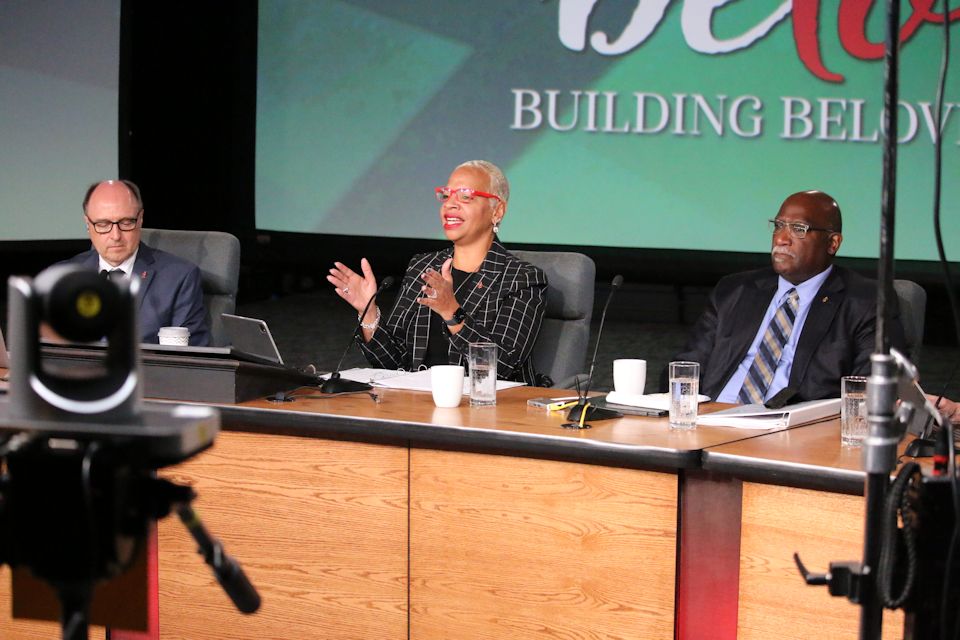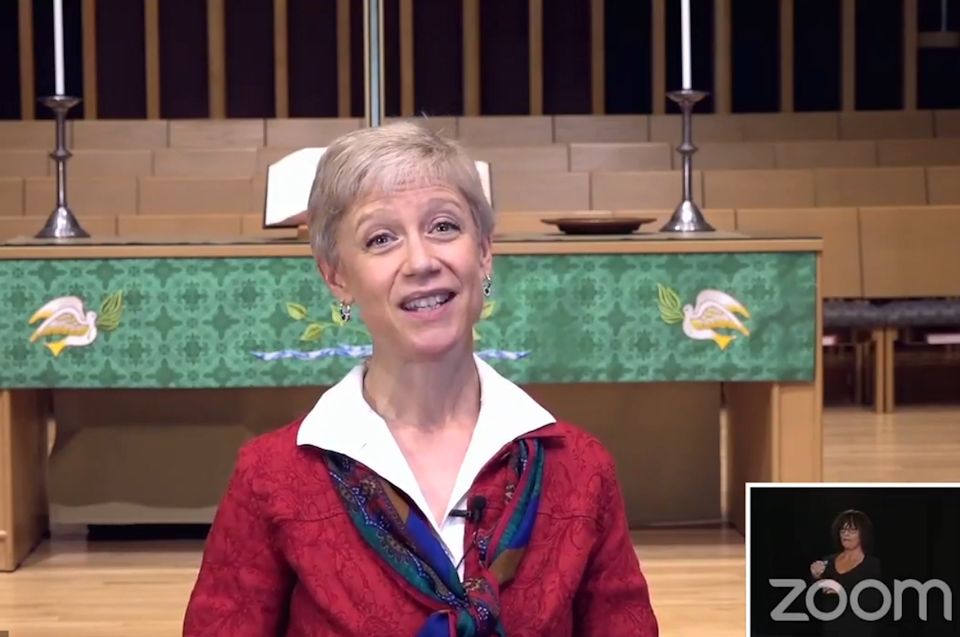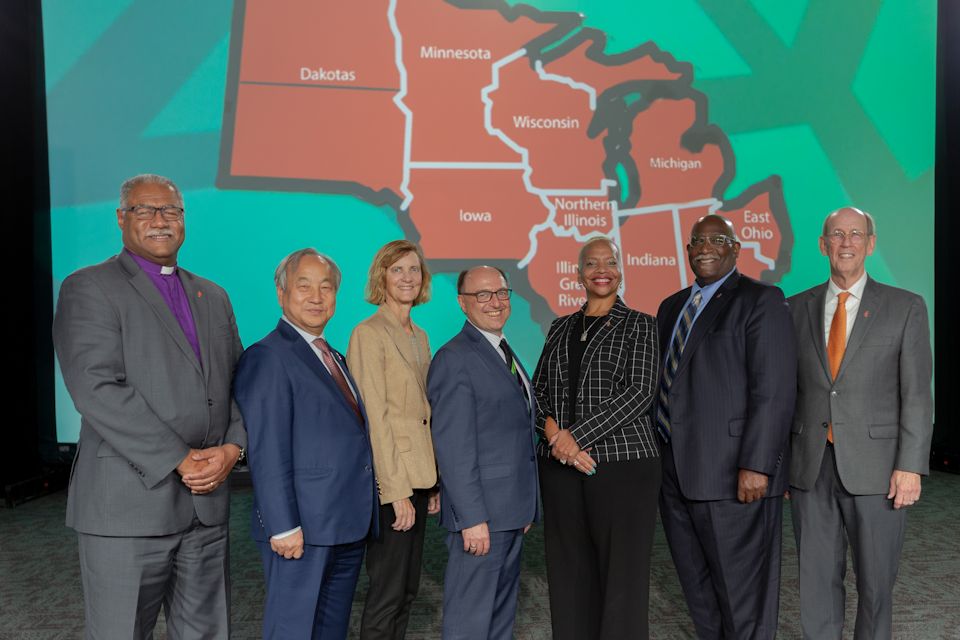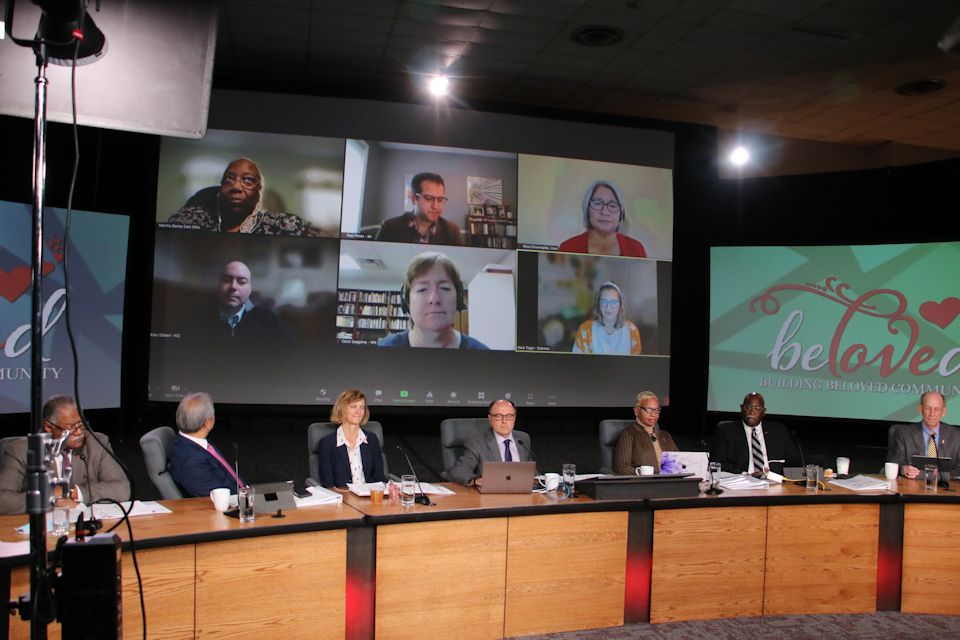On Nov. 10-11, 2021, NCJ delegates talked about anti-racism, the future of The UMC, voted to reduce NCJ bishops by one, and also approved “The Covenant to Build BeLoved Community.”
CHRISTA MELAND
Director of Communications, Minnesota Conference
When Rev. Ron Bell was in high school, his father became superintendent of the Eastern District of the Delaware Annual Conference. As their family was moving into the superintendent’s big, beautiful parsonage in Eastern Maryland, the entire local police department surrounded the house with guns drawn and told Bell and his father to get on the ground with their hands behind their heads. Why?
“Because a little white girl across the street saw black folk in her neighborhood,” said Bell, who now serves Camphor Memorial UMC in St. Paul, MN. “That’s when I knew race matters.”
Bell was among six “truthtellers” who shared their personal experiences with race at a virtual North Central Jurisdictional (NCJ) gathering that took place November 10-11, 2021. Approximately 250 delegates participated in the official Zoom meeting, and others from across the 10-conference region watched it live online.
Delegates spent the majority of their time together on three big topics of conversation—dismantling racism, the future of episcopal leadership in the NCJ, and the future of The United Methodist Church. On Thursday, they voted 142-13 in favor of a proposal to reduce the number of active bishops in the NCJ from nine to eight to align with the membership threshold for bishops that’s set by General Conference.
Dismantling racism
The session began on Wednesday morning with a focus on dismantling racism. Retired Bishop Hope Morgan Ward reminded attendees that the ministry of anti-racism centers in discipleship.
“The arc of history bends toward justice, and we will be forceful in pulling that arc down together, all to the glory of God,” she said. She noted that the Council of Bishops has centered on the ministries of equity, inclusion, justice, diversity, and antiracism. She expressed appreciation for the work of Brian Stevenson, founder of the Equal Justice Initiative in Montgomery, AL, and chief creator of the National Memorial for Peace and Justice. Stevenson provides four pillars for anti-racism efforts:
- Hear and share true stories; in particular, give space and honor to stories of people of
- Get “proximate” to the suffering and pain of racism and inequality.
- Expect resistance.
- Protect your hopefulness.
After hearing from Ward, the six truthtellers each issued a challenge to the North Central Jurisdiction and the Church via video.

“Justice takes more than just words; it requires sacrifice,” said Andres De Arco, National Assistant Director to the United Methodist Hispanic Youth Leadership Academy and a member of the West Ohio Conference. “What are you willing to sacrifice for justice?”
Bishop Ward ended her presentation with notes of urgency. “The time to connect with our neighbors is now! The time to nurture friendship and trust and mutuality is now!” She reported that a young pastor in North Carolina compared readiness to engage racism to disaster response. “We talk about disaster preparedness, we train early response teams, we send first responders, we are committed for the long haul. Might we consider our efforts in racism similarly, given the pandemic of racism continues unabated?” she asked.
The dismantling racism session ended with small group discussions among delegates. They reflected aloud on a question posed by Bishop Tracy Smith Malone, resident bishop of the East Ohio Conference: “As you think about your context and your discipleship journey and life in Christ, how might God be calling you to make a difference, to step out more boldly and prophetically…to put your weight on the arc of history, bending toward justice?”
Laura Witkowski, co-chair of the Michigan delegation and vice-chair of the NCJ Mission Council expressed appreciation for the storytelling and the conversation that followed. “The stories opened the door for some vulnerability in the small groups,” she said. Speaking of her involvement in the implementation phase ahead, Witkowski remarked, “The Mission Council will have some work to do before the NCJ gathers again, and I am grateful for the directives that we’ve been given. Evaluating the budget with an anti-racism lens and aligning with the priorities determined by this special session is a way for us to take action as a jurisdiction and Mission Council.”
Future of NCJ episcopal leadership
Delegates on Thursday voted 142-13 in favor of a recommendation for eight active bishops in the North Central Jurisdiction as of the next regular session of the jurisdictional conference—representing a decrease from the nine bishops who have led the jurisdiction since 2008.
The Rev. Dr. Charles Boayue, a member of the Michigan delegation, noted, “I remain concerned whether a special session of a jurisdictional or central conference or a college of bishops has authority to authorize the holding of episcopal elections and make assignments of bishops without General Conference action.” Boayue continued, “I trust, however, that our College of Bishops will carefully consider this concern and help avoid setting a precedent that could open floodgates for similar action.” Observing that there is already tension across the denomination, Boayue concluded, “I do not want to further complicate denominational strains and stresses by adding another layer of actions that might be questioned.”

In a presentation made Wednesday afternoon, the Rev. Sara Isbell, chair of the NCJ Committee on the Episcopacy and a member of the Illinois Great Rivers Conference explained that if a jurisdiction falls below a certain threshold in membership, the General Conference decides the number of bishops needed for that smaller number of members. Although the General Conference has not yet met to vote on a reduction, for several years, the NCJ has been below the number needed to secure nine bishops—so such a vote is expected at the postponed 2020 General Conference, now slated for Aug.-Sept. 2022. Isbell pointed out the NCJ could vote to stay with nine bishops, but then must figure out how to pay them, apart from the Episcopal Fund that typically covers this cost.
Isbell also asserted that the NCJ has operated over the past year with only eight bishops. Since Jan. 1, Bishop David Bard has been serving Minnesota on an interim basis in addition to being resident bishop for the Michigan Conference, Bishop Laurie Haller has been serving the Dakotas on an interim basis in addition to being resident bishop for Iowa, and Bishop John Hopkins left retirement to lead the Northern Illinois Conference. That one-year plan was extended by the action of the Council of Bishops on November 5, 2021. She stressed that the motion under consideration would not change the boundaries of the annual conferences in the NCJ. “That is a different conversation that could be handled by some future jurisdictional conference,” Isbell said.
Delegates met in small groups to explore a variety of questions around episcopal leadership and to deliberate over the motion from the NCJ Episcopacy Committee to reduce the number of bishops to eight.
The future of The UMC
Drawing on John 6: 1-14, Bishop Laurie Haller, Iowa Conference, told the story of Jesus feeding the 5,000 to close the day on Wednesday. She pointed out that after the meal, Jesus told his disciples to gather up the fragments left over, so that nothing may be lost.
“My dear friends, I know that you are tired,” said Haller. “We often think somebody else will gather the fragments of our beloved UMC and transform the world. But now it’s time for us to do something in the North Central Jurisdiction. The future of The United Methodist Church is in our hands, as we gather here to hope, to dream, to share the gospel, and to claim our connectionalism.”
Jesus sends you and me out to gather up the fragments, Haller noted, which are our mixed loyalties, our stubbornness to forgive, our reluctance to accept those who are different, and our fondness for judging. But the fragments are also the loving words we say, the songs we sing, the money we give, the food we share, and the care we offer to the discarded and battered of this world.

“No matter how many fragments we gather up or give away, the basket will always be filled with God’s love, for the circle is wide, and no one should ever have to stand alone,” Haller said. “That my friends, is beloved community. That, my friends, is our vision. That, my friends, is the future of our church. It’s time for us to do something right now.”
Delegates spent time in breakout groups at the end of the Wednesday session to discern and discuss what they value as priorities for the NCJ going forward and what the NCJ should accomplish in the next two to five years to fulfill these priorities.
The Thursday morning session of the NCJ was given to action on a “Covenant to Build BeLoved Community” drafted overnight by a six-person writing team, using delegate feedback given before and during the conference. After two hours of discussion, the Covenant passed, as amended, with the approval of 81% of the delegates. By a similar margin, the NCJ Conference also voted to affirm the recent Council of Bishops document called “A Narrative for the Continuing United Methodist Church” and “A Call to Grace,” an open letter that all United Methodists have been invited to sign. See related story.
The Rev. Paul Perez, Michigan Conference Director of Connectional Ministry and member of the delegation, served on the six-member writing team that drafted the covenant. Perez is enthusiastic about the actions taken by the NCJ. “This meeting offered our jurisdiction the unique opportunity to not only conference about the future of United Methodism in our region, but to also offer a word to the global church.” He called the NCJ affirmation of the covenant, the narrative, and the grassroots open letter, “a clear, prophetic, and hopeful direction for United Methodism in the NCJ and across the connection.”
~ Watch the NCJ Conference in its entirety on these Day 1 and Day 2 videos available on Vimeo. Kay DeMoss, Senior Content Editor for the Michigan Conference, contributed to this report.
Last Updated on November 1, 2023

